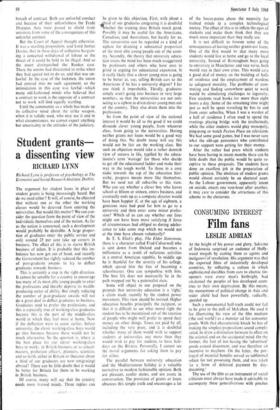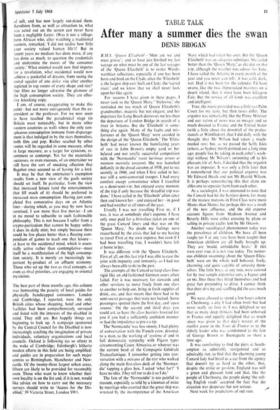Film fans
CONSUMING INTEREST LESLIE ADRIAN
At the height of his power and glory, Sukarno of Indonesia surprised an audience of Holly- wood moguls by casting them as agents and instigators-of revolution. His argument was that the exported films of industrially developed countries, by reflecting a culture in which sophisticated durables from cars to electric tin- openers were every man's birthright, had awakened the peoples of less developed coun- tries to their own deprivation. By this means, the momentum of political change in Asia and wider afield had been powerfully, radically, speeded up.
Such a monumental half-truth could not fail to be giist to the mill of McLuhan. He used it for illustrating his view of the film medium (`the reel world') as a monster ad for consumer goods. With that characteristic knack he has of making the simplest propositions sound compli- cated, he drew a distinction between its effect on the oriental and on the occidental mind. On the former, the fact of not having the 'advertised' goods caused discontent, and was therefore an incentive to mayhem. On the latter, the por- trayal of material benefits served as subliminal solace for not possessing them, and was taken 'as a form of deferred payment by day- dreaming.'
The use of the film as an instrument of social criticism must always have made it advisable to accompany these generalisations with pinches of salt, and has now largely out-dated them. Revulsion from, as well as attraction to, what was acted out on the screen can never have been a negligible factor. (Was it not a village- born African who, after watching a traditional western, remarked, 'I did not realise how little your society valued human life')? But in recent years no medium has done more, if any has done as much, to question the credentials and undermine the mores of 'the consumer society.' What oriental would now find impetus for a revolution, what occidental would now achieve a pocketful of dreams, from seeing the moral squalor of one dolce vita after another depicted in top rooms of every shape and size? Our films no longer advertise the glamour of the high consumption society. They are effec- tive knocking copy.
I am, of course, exaggerating to make this point—but not more outrageously than the ex- president or the professor. For we now seem to have reached the paradoxical stage (in Britain most noticeably, but in many other western countries as well) where the only con- spicuous consumption immune from disparage- ment is that indulged in by the stars themselves, both film and pop. Riches reached by other routes will be regarded in some measure, often in large measure, as a target for cynicism, re- sentment or contempt. Yet for the materialist successes, or even excesses, of an entertainer we still have the sort of sneaking affection that Bagehot once accused 'us of having for a lord.
It may be that the entertainer's exemption results from a new view of the goals society should set itself. In particular, from the view that increased leisure (and the entertainments that fill much of it) should be preferred to increased mass consumption. Having just com- pleted five consecutive days on an Atlantic liner—during which, as you may by now have surmised, I saw more than five movies—I am in no mood to subscribe to such fashionable philosophy. This is not because I suffer from a crypto-puritanism that cannot be happy unless it does its daily stint; but simply because there could be few places better than a floating com- pendium of games to teach one that leisure— at least to the occidental mind, which is essen- tially active rather than contemplative—must itself be a manifestation of .the high consump- tion society. It is merely an increasingly im- portant by-product of an affluent economy. Those who set up the two as rival concepts, or even as rival priorities, are engaging in oriental mysticism.
The best part of three months ago, this column was bemoaning the paucity of local guides for physically handicapped consumers. London and Cambridge, I reported, were the only British cities whose shopping, hotel and other facilities had been comprehensively surveyed and listed with the interests of the disabled in mind. They still are. But happily things are beginning to look up. A campaign sponsored by the Central Council for the Disabled is now increasingly catching the imagination of private individuals, voluntary organisations and local councils. Oxford is following (as so often) in the wake of Cambridge; Edinburgh's hitherto modest efforts in this field are being amplified; and guides are in preparation for such major centres as Birmingham, Manchester and New- castle. Of the twenty-three largest urban areas, fifteen are likely to be provided for reasonably soon. Those who want to know whether their own locality is on the list and, if it is not, would like advice on how to carry out the necessary surveys should write to `Access for the Dis- abled,' 39 Victoria Street, London SWI.











































 Previous page
Previous page